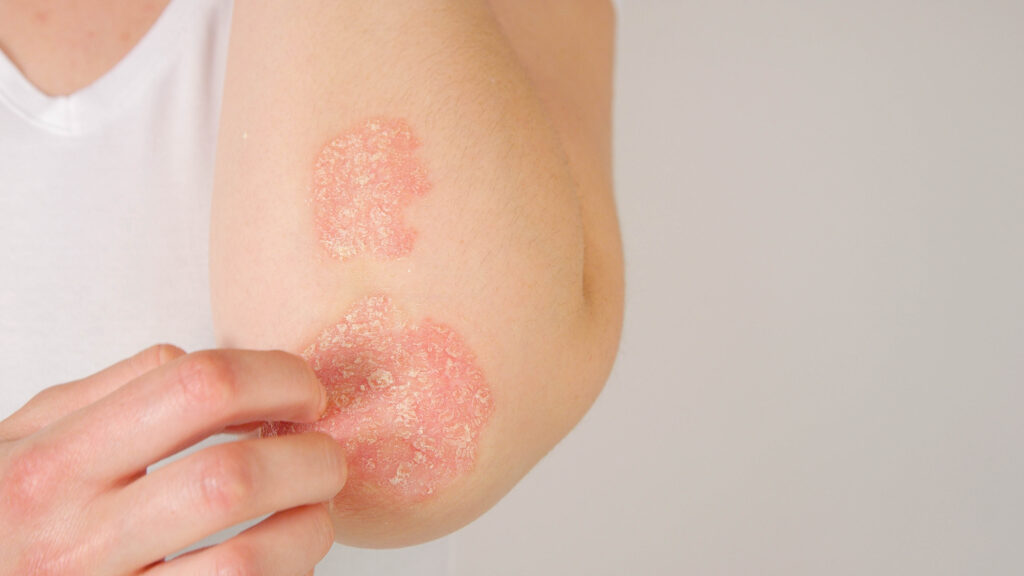Scinai’s intralesional anti-interleukin (IL)-17A/F VHH antibody fragment (‘NanoAb’) is showing promise in an in-vivo preclinical study of mild to moderate psoriasis.
Scinai’s product is a biologic intended to be delivered locally, intradermally, into the psoriatic lesions using a very short and almost painless needle. It will allow patients with mild to moderate psoriasis to benefit from a low-frequency treatment that comes with the high specificity and potency saved for biologics but with significantly reduced risk of local side effects associated with corticosteroids or systemic side effects associated with systemic administration of biologics.
The study aimed to demonstrate that local, intralesional treatment with Scinai’s NanoAb, which targets the two isoforms of the cytokine IL-17 (A and F) implicated in plaque psoriasis, has at least a non-inferior anti-inflammatory effect on the psoriatic lesions compared to corticosteroids and systemic biologics.
For this purpose, human skin was transplanted onto the back of SCID-Beige mice, and psoriasis was induced by injection of activated human peripheral blood mononuclear cells (PBMCs) from patients diagnosed with psoriasis. This disease-induced skin model reproduces key features of plaque psoriasis tissue morphology and the cytokine profile associated with the inflammatory state of plaque psoriasis lesions. The mice were divided into study groups, and each group was treated for two weeks. The therapeutic effect was then evaluated for three additional weeks, post the last treatment.
The trial’s study groups included Scinai’s anti-IL-17 NanoAbs, two comparator-approved drugs (Betamethasone, a topically applied corticosteroid used for the treatment of patients with mild to moderate psoriasis, and Secukinumab (Cosentyx, Novartis), a monoclonal anti-IL-17A antibody approved for systemic administration for the treatment of patients with moderate to severe psoriasis), and an unrelated VHH NanoAb used as a negative control.
The anti-inflammatory effect of Scinai’s NanoAbs was evaluated by measuring cytokine levels secreted by the skin tissues, including their direct target IL-17 A/F cytokines, together with other inflammatory markers such as tumor necrosis factor-alpha (TNFa), Psoriasin, HBD-2, IL-22, CD31, HLA-DR, and lymphocyte markers CD4 and CD8. Additionally, the skin’s structure, integrity, and viability were assessed by a histopathological analysis.
Scinai’s NanoAb neutralized both IL-17A and IL-17F isoforms in-vivo, according to the histopathology analysis, which demonstrated that Scinai’s NanoAb led to reduced levels of both IL-17 isoforms in the psoriatic skin tissue.
In addition, the statistical analysis of these markers confirmed that the effect of Scinai’s NanoAb on the tested inflammatory markers was similar to that of the two comparator drugs, supporting the hypothesis that intralesional injection of a nanoAb blocking the IL-17 cytokine can impact the inflammatory cytokine cascade, and lead to reduction in psoriatic lesion severity and improvement of the skin’s integrity.
The results confirm and build upon previous reported results from ex-vivo studies done with human skin specimens (conducted by Genoskin) and in a plaque psoriasis in vitro model with human skin tissue grown in a dish.
“These positive results are very encouraging and mark a significant step forward in the development of a novel treatment for the underserved needs of the mild to moderate plaque psoriatic patients,” says Dr. Tamar Ben-Yedidia, Scinai’s Chief Scientist, in a news release. “To date, most of the innovation related to treatment of autoimmune diseases has focused on drugs aimed at the more severe cases of these diseases, leaving milder cases mostly with generic topical drugs and phototherapy treatments. The mild psoriatic patients account for more than 50% of the plaque psoriatic patients. While undertreated, they are prone to painful skin lesions, sometimes in locations that generate a considerable disease burden for them. Scinai’s vision is to provide a highly efficacious, specific, convenient, and safe local biologic treatment of plaque psoriasis lesions.”
Scinai next intends to further fine-tune dosing and drug half-life and conduct a longer-duration follow-up on in-vivo animal study in late 2024, complemented by a preclinical toxicology study before commencing a first-in-human clinical trial in late 2025.


